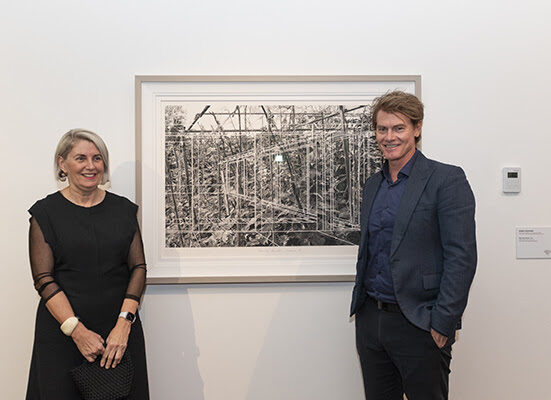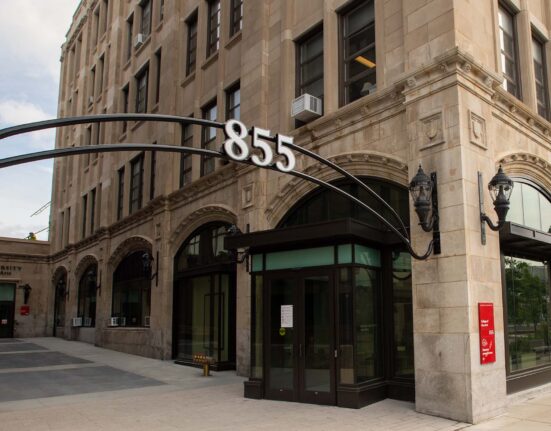La Jolla Playhouse’s 10-year-old DNA New Work Series returns Nov. 30 with readings of six new plays and projects in development, including a new piece written and directed by Pulitzer Prize-winning playwright Ayad Akhtar.

Pulitzer Prize-winning playwright Ayad Akhtar photographed in Los Angeles in 2016.
(Jay L. Clendenin/Los Angeles Times)
Some of nation’s top up-and-coming playwrights and directors take part each year in the DNA series. Over the years, it has become a launchpad for many plays and musicals that have gone on to full productions at the Playhouse and beyond, including the Broadway musicals “Memphis” and “Diana” and off-Broadway’s “The Coast Starlight.” This season’s “Sumo” at the Playhouse came out of the 2021 DNA series and the Playhouse’s upcoming season production of “Derecho” was part of the 2022 DNA series.
“The DNA New Work Series serves as a vital pipeline for new work — on our stages and beyond,” said Playhouse artistic director Christopher Ashley, in a statement. “Over the last decade, DNA has become one of the Playhouse’s most popular programs. Patrons relish the opportunity to take part in the birth of a new play, while giving playwrights invaluable support and feedback in the earliest stages of development.”

La Jolla Playhouse Artistic Director Christopher Ashley.
(Courtesy of Becca Batista)
This year’s DNA series will run Nov. 30 through Dec. 10 in the Playhouse’s Rao and Padma Makineni Play Development Center (PDC) and in its Seuss 1 rehearsal spaces. Following development and rehearsal time, the plays will receive multiple performances before an audience, followed by audience talkbacks to gather information for future rewrites. The performances are presented by the actors reading from scripts with no costumes, scenery or production elements.
Here’s this year’s lineup:
“Suburban Black Girl” by Zakiya Young — Jacole Kitchen, the Playhouse’s director of arts engagement and in-house casting, directs this solo play written by and starring Young, who is best known for her role in HBO Max’s “Pretty Little Liars: Original Sin.” Young is a code-switching suburban Black girl who has mastered the art of being non-threatening to White people. That is, until COVID lockdowns put a spotlight on police killing unarmed Black people. Then everything she suppressed begins seeping out like an infected wound. 7 p.m. Nov. 30; 7 p.m. Dec. 2.

Zakiya Young at a screening for HBO Max’s “Pretty Little Liars: Original Sin” in 2022.
(Getty Images)
“Human Museum” by Miyoko Conley — Jesca Prudencio directs this play set on Earth in a future where humans have become extinct. The story follows a group of robots that run a museum dedicated to organizing the physical and digital artifacts of human life. On the centenary of human extinction, a sudden radio call upends everything the robots thought they knew about the last days of humanity. 7 p.m. Dec. 1; 3 p.m. Dec. 3.
“59 Acres” by Marike Splint — This new site-specific, immersive soundwalk is being developed for the Playhouse’s Without Walls Festival. Layered with disarming metaphors, historical details, and personal musings, this piece will take audience members on an enhanced walking tour of the Playhouse campus landscape. Splint’s Google Earth-inspired video travelogue “You Are Here” was presented as part of the Playhouse’s all-digital 2020 WOW fest. Tours will leave at 3, 3:30, 3:45, 4 and 4:15 p.m. Dec. 1; and at noon, 12:15, 12:30, 12:45, 1, 1:15 and 1:30 p.m. Dec. 3.
“McNeal” by Ayad Akhtar — Akhtar’s latest play is the story of Jacob McNeal, a successful (but possibly unscrupulous) author and perennial Nobel Prize for Literature candidate, with an estranged son, a new novel, plenty of old axes to grind, stage 2 liver failure and an unhealthy fascination with artificial intelligence. Akhtar won the 2013 Pulitzer Prize for Drama for his play “Disgraced.” La Jolla Playhouse has presented the world premieres of two Akhtar plays that went on to Broadway, the Tony-nominated “Junk” and “The Who & the What.” He’s also the author of two novels, “Homeland Elegies” and “American Dervish.” 7 p.m. Dec. 7; 7 p.m. Dec. 9.
“To Red Tendons” by Peter Kim George — Kat Yen directs this drama inspired by the deadly Los Angeles riots of 1992, which were spurred by a jury acquitting four White L.A. police officers in the arrest and beating of Black motorist Rodney King. Much of the riot’s destruction was centered in Koreatown, where tensions between the Black and Korean communities were already high after a Korean shopkeeper shot and killed a Black teenage girl in 1991 but received no prison time. In Yen’s play, a group of young actors come together to re-enact a “primal scene” from the L.A. unrest in 1992 using elements of group psychotherapy. The play examines what happens when seething anger is turned inward, as well as the desire for reconciliation. 7 p.m. Dec. 8; 3 p.m. Dec. 10.
“Sound Place Love” by Braden Abraham and Gordon Hempton — Another WOW Festival work in progress, this theatrical piece will be based on the audio recordings of Hempton, an acoustic ecologist known as The Sound Tracker. Hempton spent decades capturing disappearing natural environments across the Earth, using a specialized microphone that emulates human hearing. Distilled from hundreds of hours of personal recordings and interviews, this project will feature some of his most beautiful and engaging recordings around the globe and his personal struggle with hearing loss. Abraham will direct. 5 and 7 p.m. Dec. 5; 5 and 7 p.m. Dec. 6.
Admission to the plays is free, but reservations are required. For reservations, visit lajollaplayhouse.org/dna-2023/.

A scene from the Zach Redler-Jerry Dye chamber opera “The Falling and the Rising,” which will be presented by San Diego’s Bodhi Tree Concerts in May 2024.
(Courtesy of SFC Ben Hilgert)
Bodhi Tree revives ‘The Falling and the Rising’
Last spring, San Diego Opera canceled its long-planned production of the chamber opera “The Falling and the Rising,” citing a mix of lower-than-expected ticket sales and rising expenses.
But there’s good news for opera fans who were looking forward to the military-themed show. Diana and Walter DuMelle, who run San Diego’s Bodhi Tree Concerts, felt the opera would have great resonance with San Diego audiences, so they negotiated with the opera’s creators and will produce the work’s San Diego premiere May 10-12 as part of its four-show 2024 season.
“The Falling and the Rising,” with a score by Zach Redler and libretto by Jerry Dye, is the story of an American female soldier who is severely wounded by a roadside bomb and placed in an induced coma to reduce trauma to her brain. In this dreamlike state, she must make the journey toward healing and home. The opera’s story was based on dozens of interviews with active-duty soldiers and veterans at hospitals on the East Coast. The opera was originally co-commissioned by San Diego Opera, the U.S. Army Field Band and Soldier’s Chorus, Seattle Opera, Arizona Opera, Opera Memphis, TCU, and Seagle Music Colony.
For tickets, and a look at Bodhi Tree’s full 2024 season, visit bodhitreeconcerts.org.

Portrait of Bill Virchis.
(Nelvin C. Cepeda/San Diego Union-Tribune)
Theater Alliance honors Virchis as industry ‘pioneer’
The Theatre Alliance of San Diego honored William A. “Bill” Virchis with its Theatre Pioneer Award at a ceremony earlier this month. The award honors his more than 50 years of work in San Diego County as an educator, producer, director and actor in theater, film and television.
Virchis is the co-founder and producing artistic director of the bilingual theater company Teatro Máscara Mágica in San Ysidro. He’s also a professor emeritus of Southwestern College in Chula Vista and former district director of the Visual and Performing Arts Department of the Sweetwater Union High School District. Over the years, he has directed, produced and acted in more than 300 theater productions throughout the American Southwest.
Born in Mexico City, Virchis moved with his family to the San Diego border community of San Ysidro when he was 7 years old. He has dedicated much of his life to telling the stories of the region’s multicultural communities and their history. In an August opinion column for the San Diego Union-Tribune, Virchis spoke about the importance of representation.
“Teatro Máscara Mágica was founded under the principle that our story is very important for generations to come. We are the foundation, especially in the Southwest, of our theatrical voice. We are the gatekeepers. We are the elders — I didn’t want to be an elder, but I am now — and it’s our responsibility to make sure that future audiences and generations of our community embrace our stories, and nurture future playwrights, actors, technicians, directors, designers, musicians, dancers, visual artists and audiences,” he said.
pam.kragen@sduniontribune.com







